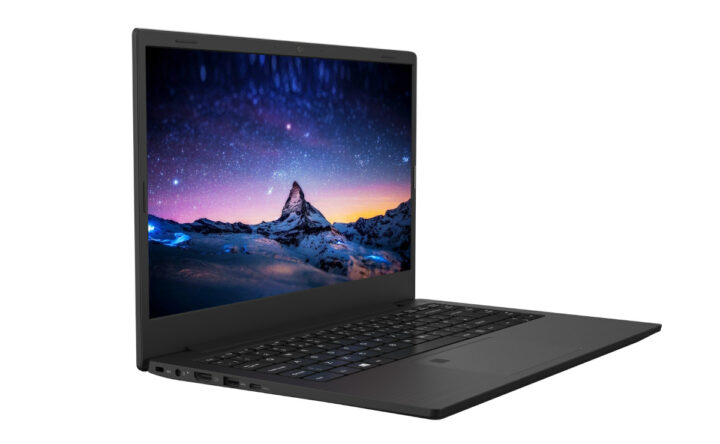ROMA is an upcoming Linux laptop equipped with an unnamed quad-core RISC-V processor with GPU and NPU, up to 16GB RAM, 256GB storage, primarily aimed at software developers, and with Web3 technology integration.
The ROMA laptop will be born out of the collaboration between DeepComputing working on engineering and Xcalibyte taking care of system tuning, plus PW (assembly), ECP (security), XC (crypto), Rexeen (voice), and the LatticeX Foundation (PoS blockchain, NFT).
ROMA laptop preliminary specifications:
- SoC – Quad-core RISC-V CPU with GPU for graphics, NPU for AI (12nm chip for the Pro model, 28nm chip for the Standard model)
- System Memory – 16GB LPDDR4/LPDDR4X RAM
- Storage – 256GB eMMC flash
- Security – Arm SC300 security enclave processor
- Display, keyboard, touchpad
I agree that’s a bit light on details. We’re told the laptop will support most Linux operating systems and the company will offer free SoC and SoM upgrades, as well as “early access to next-generation laptop and accessory upgrades at generous discounts”. If I read that right that means you’d pay once and get free hardware upgrades for the rest of the laptop’s life. That’s going to be a hefty price tag, or it will rely on the ever-increasing value of whatever crypto or NFT is attached to the laptop. By the way, the first 100 orders will get a free NFT, and the laptop will ship with a MetaMask-style wallet.
But let’s put aside crypto, blockchain, NFTs, the Metaverse, and Web3 technology aside for a moment, as the true innovation, disruptive technology that will reverberate through the markets for years to come is THIS:
If that thing had an Apple logo, I could already see your jaw drop to the floor in awe. That’s the ROMA packaging used as a laptop stand. All jokes aside, provided it’s indeed sturdy enough, all laptop packagings should be made that way.
The “pre-orders” are opened for the ROMA laptop, but it’s more about filling out a form to express your interest since the payment method is not asked for. Note that personal email addresses (gmail, hotmail, …) are not accepted, and you’d need to use a company’s email address or one with your own domain name. As mentioned previously, the first 100 customers to pre-order ROMA will receive a unique NFT to mark the birth of the world’s first native RISC-V development platform laptop, and you can have your ROMA personally engraved with your name or company name.
While I’m not sure the ROMA RISC-V laptop will be successful with the lack of concrete details and all the buzzwords in the announcement, RISC-V laptops are being worked on by several companies, as we recently reported about a survey from StarFive planning to make a RISC-V laptop or mini PC with performance similar to Rockchip RK3588 SoC.
Via RISC-V and Liliputing

Jean-Luc started CNX Software in 2010 as a part-time endeavor, before quitting his job as a software engineering manager, and starting to write daily news, and reviews full time later in 2011.
Support CNX Software! Donate via cryptocurrencies, become a Patron on Patreon, or purchase goods on Amazon or Aliexpress







Advertising with NFTs, crypto, web3… Yeah, that’s a great way of ensuring I wouldn’t be touching that thing even if I was paid for it.
Exactly
My phone can do html, pdf, bitcoin and SSL…
WPA3!
😀
I’ve been told the processor will be based on T-Head C920, and cost $3,000. TBC.
> T-Head C920,
Is that a new chip? Google doesn’t know it as a RISCV chip.
> and cost $3,000
Oh, hahaha. I wish them good luck with that.
> Google doesn’t know it as a RISCV chip.
That’s probably why they can’t mention the chip.
If you’ve got news of a new T-Head chip, then that’s a real scoop!
hmm – hopefully the T-Head C920 will have the ratified extensions – especially Vector.
I’ve found that thread actually by looking at the recent release notes of Xuantie 9xx compilers.
They have release notes on their website that also mentions 3 other processors:
Version 2.4.0 from May 2022 mentions “First version to support latest C908 processor), that only mentions that it optimises RVV performance, adds support for B extention (bitmanip v0.94)
Release notes for 2.2.6 are actually more interesting:
I guess that means that there will be C906FDV, C908 and C920, which will support RVV 1.0 and few more things.
Apart from that I wasn’t able to get anything useful out of it.
UPD: nevermind, it have it’s own page:
https://occ.t-head.cn/vendor/detail/index?id=4082464366237126656&vendorId=-1&module=0
In download section it have “datasheet” in English that says: C920 adopts a state of the art 12-stage out-of-order multiple issue superscalar pipeline with high frequency, IPC, and power efficiency, with a 128-bit vector unit implementing the RISC-V V Extension 0.7.1.
There is also user manual with more details, but in Chinesee.
Overall “datasheet” looks like it’s almost same as C910. Interesting enough, Vector extension is never mentioned in C910 “datasheet”.
So … C920 to be announced at the Apsara Conference 2022 … ?
Like they announced the Xuantie E902, E906, C906, and C910 at the october 2021 conference?
Disclaimer: This is just a long, long shot & wild, wild guess.
I don’t think a crypto bro would want to use a slow quad-core for $3k, but hey, it’s better than an NFT.
If they can market it as the only secure laptop for illegal activity, then the performance doesn’t matter as much.
It’s supposed to cost 3,000 BTC actually…
As I know, the 28nm chip is JH7110, the 12nm chip is JH8100
As others say, it smells wrong. To gimmicky. 🙄
Let’s first wait for the marketing garbage for morons to clear up. We’ll then likely be able to see what the processor is, and how much it costs 🙂
Today isn’t the first of april – or is it?
What price?
Srutututu … with the GPU? Which one? imagination? That would have to mean that alibaba ( T-head) is secretly cooking some sensible core of risc-v
No GPU
So we do not know who is manufacturing the ROMA laptop but merely that Xcalibyte (a software analysis tool company) is debugging and testing the software and more significantly “managing ROMA oversea public relationships and sales.”
So the person or persons unknown behind the laptop wish to retain a cloak of anonymity?
T-Head (Pingtouge Semiconductor) is a wholly owned subsidiary of Alibaba.
According to the i3 Investor website, in a much more in depth article by Tan KW on the proposed ROMA laptop,
“DeepComputing has the same CEO and founder as Xcalibyte, Yuning Liang.”
and that
“a company called PW is assembling the laptop.”
So who the company called PW is, is anybody’s guess.
I guess that if something goes wrong with the laptop, then the problem can be passed back and forth between the three companies.
Why 16 GB of ram.. with 4 cores, and those will be very bad performance wise cpu cores, 16GB is overkill. I am quite sure that those 4 cores will as close as a cortex a72 at best… very bad idea.
RISC-v 这不就很坑爹了,应用丰富程度,risc-V<arm<X86
I’ve received an email with a quote and more details.
That would be $4,999 for the laptop with 3 years worth of hardware upgrades, and free repairs for the life of the laptop.
The laptop comes with a 14.1-inch Full HD display, Gigabit Ethernet, WiFi 6, Bluetooth, and is supposed to last up to 10 hours per charge.
Preferred package*
Basic Package – Q2/3 2023, 1,000-2,000 USD
Standard Package – Q1/2 2023, 2,000-3,000 USD
Limited Edition Premium Package – Q3/4 2022, 3,000-5,000 USD